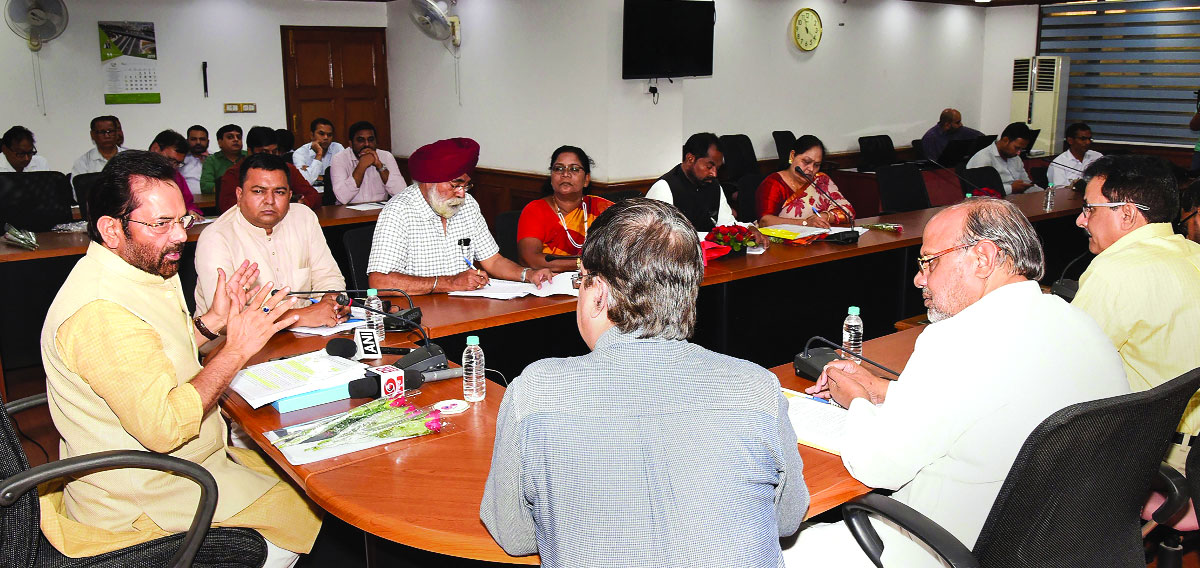50% for girls; Govt plans to modernise madrasa education
In a major outreach towards “minority” community, the Centre on Tuesday announced scholarships for 5 crore minority students, including 50 per cent for girls, in next five-years and sought to “mainstream” madrasa education.
“There are a large number of madrasas across the country. They will be connected with the formal education and mainstream education so that those children studying there can contribute in the development of society,” said Union Minister for Minority Affairs Mukhtar Abbas Naqvi.
The Minister chaired the 112th governing body meeting of Maulana Azad Education Foundation at Antyodaya Bhawan here.
Several scholarships such as pre-matric, post-matric and merit-cum-means will be provided to 5 crore students for 5 years, Naqvi said.
He said the Modi Government has created an atmosphere of healthy inclusive growth by eradicating “disease of communalism” and appeasement politics. He said the programme for the mainstreaming of the madrasa education would be launched next month.
Modernisation of madrasas is in line with Modi’s plan that he laid out in run-up to Lok Sabha elections in 2014. “Hold Quran in one hand and computer in other,” Modi had said.
While chairing the meeting, Naqvi said the Centre has proved to be a “government of authority, justice and integrity”.
The Modi Government is a dispensation committed to “samaveshi vikas, sarvsparshi vishwas (inclusive growth with trust)”, he said.
Naqvi said girls from minority communities who have dropped out of school will be linked to education and employment through “bridge courses” from reputed educational institutions of the country.
Madrasa teachers across the country will be trained by various institutions in mainstream subjects such as Hindi, English, Maths, Science and Computer so that they can impart mainstream education to the madrassa students, Naqvi told reporters after the meeting.
To ensure socio-economic and educational empowerment of minorities, especially girls through “3Es” --- education, employment and empowerment --- various scholarships such as pre-matric, post-matric and merit-cum-means will be provided to 5 crore students. This includes more than 10 lakh Begum Hazrat Mahal girls scholarship in the next five years for economically weaker sections.
Naqvi also said schools, colleges, ITIs, polytechnics, girls hostels, gurukul-type residential schools and common service centres are being constructed on a war-footing under the Pradhanmantri Jan Vikas Karykram (PMJVK) in areas devoid of educational infrastructure.
The “Padho-Badho” awareness campaign will be launched across the country to encourage education, especially among girls from minority communities from those areas where people do not send their children to schools due to socio-economic reasons, the minister said.
“The campaign will be focussed on girls. This awareness campaign will include ‘Nukkad Natak’ (street plays), short films and cultural programmes. The campaign will be launched in 60 minority concentrated districts of the country in the first phase,” he said.
Naqvi said free coaching for Central and State administrative services, banking services, staff selection commission, railways and other competitive services will be provided to economically weak sections from minority communities --- Muslims, Christians, Sikhs, Jains, Buddhists and Parsis.
A major controversy had erupted early this year after Shia Central Waqf Board wrote to the Prime Minister to shut down the Muslim seminaries across India and turn them into “secular” schools affiliated to CBSE or ICSE boards. The Shia board alleged that madrasas encourage students to join terrorism.
Interestingly, Pakistan too is bringing over 30,000 madrasas into the mainstream education system as part of a determined campaign to combat extremism, a PTI report quoted military spokesperson as saying on Monday in Islamabad.
Addressing a press conference in Rawalpindi, Major General Asif Ghafoor said Pakistan had witnessed a surge in religious seminaries from 247 madrasas in 1947 to 2,861 in 1980.
“And now there are over 30,000 madrasas. Out of these, only 100 are involved in propagating terrorism,” he said, adding that several steps were afoot to control and bring the seminaries into the mainstream.

























